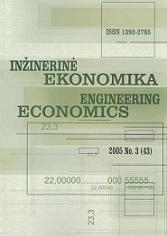Entrepreneurship in Sustainable Development: SMEs Innovativeness in Lithuania
Entrepreneurship in Sustainable Development: SMEs Innovativeness in Lithuania
Author(s): Kęstutis Kriščiūnas, Jolita GreblikaitėSubject(s): Economy
Published by: Kauno Technologijos Universitetas
Keywords: entrepreneurship; modernity of entrepreneurship; responsible entrepreneurship; small and medium-sized enterprise (SME); social responsibility; knowledge; knowledge-based economy (KBE); economic sustainability.
Summary/Abstract: Purpose of the article – Different economic development in the European Union (EU) countries, especially evaluating knowledge-based economy (KBE), conditions migration of knowledge workers. Usually for that reason the less developed countries are suffering. So the inducement of innovation processes, good conditions of entrepreneurship are important factors, capable strongly influence accumulation of intellect instead of its lost. KBE is based on knowledge generation and utilisation, innovation, technology transfer, and, of course, entrepreneurial activity (Krisciunas, Rinkevicius, 2002). These components help to successfully guarantee sustainable economic development. The actuality of entrepreneurship in KBE reveals the scientific problem showing interplay between economic sustainability and modernization of entrepreneurship, which could even influence migration flows. The aim of research is to reveal why entrepreneurship is so important in sustainable economic development, especially looking at innovative SMEs as an entrepreneurial enterprises. Design/methodology/approach – Theoretical research and analysis of scientific articles and statistical data on small and medium-sized enterprises (SMEs) in the EU are used in this study. Findings – The development of entrepreneurship research was revealed; the features of modernity of entrepreneurship in economic sustainability as sociability, competitiveness, progressiveness, knowledge generation and usage, innovativeness, dynamism were disclosed. The result of the interplay of modernity of entrepreneurship and migration flows was detected and proves that the entrepreneurship could stop migration flows from native countries, creating job places and generating income. Lithuanian SMEs innovativeness was shortly analysed and evaluated. In the country they are less innovative than large enterprises, but the results show about the average in the EU. Research limitations/implications – Theoretical conceptions and relevant indicators crystallised in the article would allow to expand the research in the future and include purposive and broader empirical analysis. Originality/value – Research revealed that the valuation of entrepreneurship seeing form Schumpeter’s research works is changing and developing. It is important to embody these new conceptions in the EU countries essential documents, related with economic development. New conception of modern responsible entrepreneurship in sustainable economic development should be used in practical activity of knowledge-based SMEs, embedding development and penetration of KBE economy and sustainable economic development.
Journal: Engineering Economics
- Issue Year: 2007
- Issue No: 4 (54)
- Page Range: 20-26
- Page Count: 7
- Language: English

